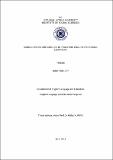DSpace Repository
USING LITERATURE CIRCLES IN TEACHING ENGLISH TO YOUNG LEARNERS
JavaScript is disabled for your browser. Some features of this site may not work without it.
| dc.contributor.author | KÖKLER, Dilek
|
|
| dc.date.accessioned | 2021-05-31T11:53:07Z | |
| dc.date.available | 2021-05-31T11:53:07Z | |
| dc.date.issued | 2019 | |
| dc.identifier.uri | http://hdl.handle.net/11547/8698 | |
| dc.description.abstract | Literature circles are small, peer-led discussion groups whose members chose to read some stories, while reading each member takes notes and later everyone comes to the group with ideas to share. Each group follows a schedule for reading and meeting, holding regular conversations on the way through the book (Daniels,2002). Peed-led literature circles provide learners with an outstanding opportunity to familiarize themselves with authentic stories while working collaboratively in groups by establishing rules for responding and discussing and keeping on-task communication to reflect their understanding of what they are reading. The idea of literature circles isn't recent, but it's hardly accepted in the EFL world. Similarly, many researches show that the implementation of literary circles through concepts is even less visible in the world of education. In addition, even the basics of literature courses are not favored by EFL educators to enchant their linguistic learning either. The purpose of this research was to investigate the benefits of using literature circles with young learners in EFL settings. Besides, it was an attempt to find out the possible challenges the teachers may experience in implementing literature circles in English lessons. The study was conducted in the second term of 2018-2019 academic year at a private primary school in İstanbul, Turkey. The participants in the study were 18 third grade beginner language proficiency students. The tools of data collection with a qualitative approach were semi-structured interviews, checklists and rubrics as self-assessment tools and the teacher’s observation diary. The results of the data indicated that the students were exposed to authentic language that contributed to their learning while the use of age appropriate text also gave students the chance to connect and discuss their connections with peers. The students also identified with both the characters and events that increased their motivation to continue reading. Finally, it was observed that the learners liked choosing their own books, roles and projects. The research also examined possible issues that the teachers may experience, such as adjusting a comprehensive integrated reading writing program to young EFL learners and coping with the students’ needs with different language abilities working in the same group to fulfill their tasks | tr_TR |
| dc.subject | Authentic Short Stories | tr_TR |
| dc.subject | Reading | tr_TR |
| dc.subject | Concept-based reading | tr_TR |
| dc.subject | Literature Circles | tr_TR |
| dc.title | USING LITERATURE CIRCLES IN TEACHING ENGLISH TO YOUNG LEARNERS | tr_TR |
| dc.type | Thesis | tr_TR |
Files in this item
This item appears in the following Collection(s)
-
Tezler -- Thesis [3470]
